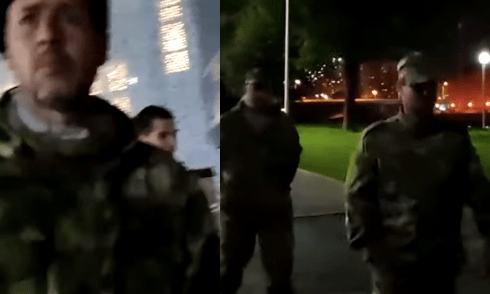Russian ‘Cossack soldiers’ prowled the streets hunting down LGBT+ folk during Pride week. They wound up targeting straight people

Men in Russian Cossack military uniform patrolling the Yekaterinburg waterfront (E1.RU/YouTube/@ИСТОРИИ ИЗ РОССИИ)
Groups of men in Cossack military uniforms have been filmed roaming the Russian city of Yekaterinburg during Pride week in “anti-LGBT patrols”.
According to the Russian news outlet E1RU, the men were on the look out for LGBT+ activists, but succeeded in targeting straight people who they thought looked queer.
The group briefly detained at least one “absolutely heterosexual” student, 19-year-old Alexander Zinovyev, because he had dyed hair and wore an earring.
“Why’d you dress up like this? Are you one of them?” Zinovyev recounted one of the men saying to him. “Do you even know that we control the propaganda of gayness among the people?”
He said the men who intimidated him carried certificates declaring themselves to be “Ural Voluntary Cossack Corps”. While most of the group were dressed in military camouflage, others were patrolling in civilian clothes.
The men reportedly intended to detain LGBT+ people whom they deemed to be in violation of Russia’s gay propaganda laws, and turn them in to law enforcement.
“The prosecutor’s office issued a warning to them about the inadmissibility of propaganda. We’ll be checking how the LGBT movement representatives comply with Russian legislation,” Oleg Bogunevich, the deputy head of a local Cossack organisation, told URA News.
He claimed that around fifty people were participating in the patrols, with some Cossacks travelling over 200km from Chelyabinsk to support their Yekaterinburg “brothers”.
Opponents of the LGBT+ activists have also organised a rival “traditional values” week that includes a family parade and an Orthodox Christian fair.
The patrols come after Russia adopted a set of wide-ranging constitutional changes, including a provision that defines marriage solely as a “union between a man and a woman”.
Same-sex marriage is already banned, but the constitutional re-write means marriages registered abroad will no longer be recognised, and makes the prospect of it ever being legalised dimmer than ever for Russian activists.

